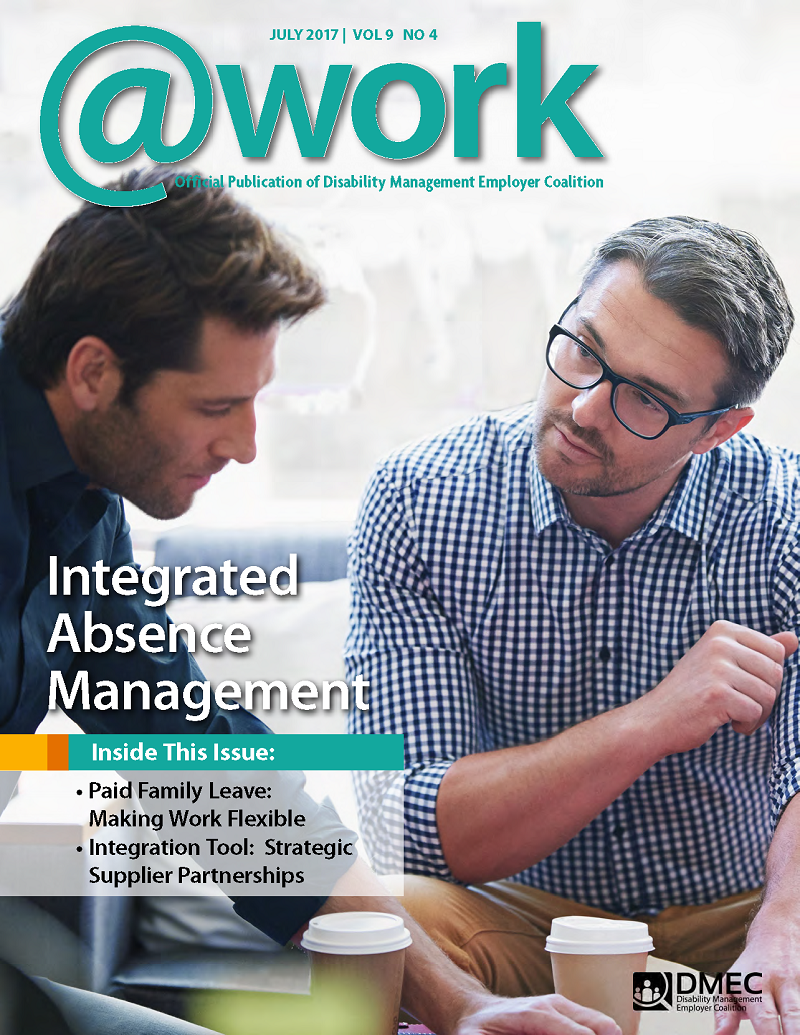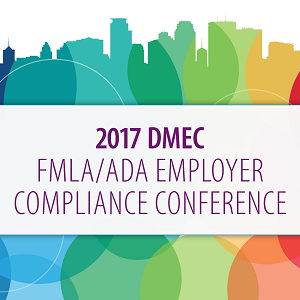
July 2017
Integrated Absence Management
Integration has seen substantial success over the last 25 years, but it is still only partially implemented for some employers or still on the wish list for others. This issue of @Work highlights challenges to integration and best practices for overcoming them.
Features
Paid Family Leave Makes Work Flexible
Some employers are providing paid family leave (PFL) as a popular addition to employee benefit packages, and are finding that it can help improve employee engagement and productivity. PFL is a complex benefit with multiple factors affecting cost and perceived value to employees. Read more.

Integration Tool: Strategic Supplier Partnerships
When employers pursue integrated absence management, they often bring suppliers into strategic partnerships to achieve their ambitious goals. And through vendor summits, employers can create a program environment where integration is facilitated. Read more.

Spotlight Articles
Program Showcase: Reducing Progression to STD
From the 30,000-foot view, the “leave universe” looks like a collage of employee entitlements that don’t fit together neatly. Some new patterns in this collage became the basis for an early intervention pilot program giving employees a large role in finding solutions for needs that result in leaves. Read more.

RTW Case Study: ADA Interactive Process
An unreasonable number of unscheduled absences due to FMLA leave can disrupt productivity. How can organizations accommodate employees with serious medical conditions and legitimate work limitations while keeping FMLA abusers at bay? Read more.

Compliance Makeover: Exceeding ADA Requirements
Despite Americans with Disabilities Act (ADA) litigation horror stories, some employers surpass ADA requirements and provide extra support to employees without suffering legal penalties. Read more.

Columns
Wrestling with ADA, FMLA, and Overtime: “No Overtime” & Reasonable Accommodations
Unlike the Family and Medical Leave Act, the Americans with Disabilities Act provides employers with some options and defenses in addressing a no-overtime restriction as an accommodation. Read more.

Integrated Absence Management: Early RTW & Employer Medical Spend
Early return to work is a valuable cost-control approach that can be more effective than other strategies. By helping workers return to work as soon as appropriate, an employer often saves medical, indemnity, and indirect costs such as overtime. Read more.

Employee Financial Fitness: Paid Family Leave
While the Family and Medical and Leave Act of 1993 guarantees workers up to 12 weeks of unpaid leave per year without the threat of losing their job, the United States is the only developed nation that doesn’t mandate paid family leave. Read more.

Ask the Accommodation Experts: Unpredictable Health Conditions
Managers often struggle for solutions after last-moment absence requests by employees. Nonetheless, some health conditions do flare up unpredictably. Jenny Haykin and Tom Sproger discuss how to approach unpredictable absences. Read more.

Absence Matters: Health Assistants Support Integrated Benefits
The introduction of a health assistant is expected to make long-awaited in-roads to program integration. It is believed a single resource for all questions can deliver much needed simplicity in what have become highly complex and specialized areas. Read more.

Untangling the ADA, FMLA, WC Web: Aligning WC & Disability RTW
It is no secret that employers with RTW programs tend to experience shorter claim durations and lower disability related costs. As employers continue to implement RTW programs, they wrestle with whether they should apply the same RTW rules for their WC and disability programs. Read more.

Overcoming the Disability Epidemic: Behavioral Factors in Integrated Absence Management
It isn’t a question of whether behavioral factors matter in integrated absence management. Instead, it’s a question of whether we address them deliberately, or whether behavioral factors sabotage and undermine our best efforts. Read more.

The Future of Leave Management: An Interview with Senator Kirsten Gillibrand
Feb. 5, 2017 marked the 24th anniversary of the groundbreaking federal Family and Medical Leave Act (FMLA). Shortly thereafter, the Family Act, legislation to create a self-sustaining family insurance program for all American workers, was reintroduced. Read more.

Piecing Together the Integration Puzzle: The HR Law Bermuda Triangle
Some employee absence events may trigger not just one law, but the Americans with Disabilities Act, the Family and Medical Leave Act, and state workers’ compensation laws. Violations of these laws may cause penalties to employers and sometimes even to managers. Read more.

Departments
The CEO’s Desk: 25 Years of Thinking “Outside the Silo”
DMEC began its efforts around the integration of insurance silos, return to work, and integrated disability management. Over the last 25 years, this has expanded to integrated absence management, which covers disability, leave, FMLA, ADA, and workers’ compensation compliance, and employee well-being and productivity programs. Read more.

DMEC News: July 2017
This month’s DMEC News features a recap of the recording-breaking 2017 DMEC FMLA/ADA Employer Compliance Conference and Frank Alvarez’s acceptance of the 2017 Partnership Award at the conference. Read more.

Compliance Memos: July 2017
The July 2017 compliance memos cover the expanded reach of ERISA exemption, state and local law updates, and reduced FMLA notice requirements. Read more.




